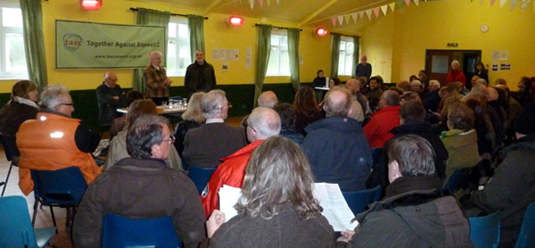
Crowded meeting demands Council Action
Almost eighty people attended the first of a series of meetings arranged by ‘Together Against Sizewell C’ (TASC). The meeting at Yoxford Village Hall was chaired by Joan Girling and the two main speakers were Professor Andy Blowers, who was awarded on OBE in 2000 for services to the environment and Pete Wilkinson, a former member of the Government’s Committee on Radioactive Waste Management. They both provided comprehensive accounts of a range of issues in relation to energy needs, finance, coastal processes, the environment and emergency planning. The packed audience then responded to an enthusiastic question and answer session.
Professor Blowers expressed strong criticism of the financing and locations for the proposed new generation of power stations saying that financing through fixed unit pricing was effectively a subsidy. He also said that ‘to suggest that there are only eight suitable sites for new nuclear build in the UK is ludicrous: existing nuclear sites have been chosen because the government believes that opposition would be less hostile in those areas. This represents a gross injustice to those communities’. He highlighted the risk of nuclear saying ‘nuclear is not safe. It is a highly complex technology where things do go wrong as is evidenced by three major accidents in a single generation.’ He said that the costs of nuclear are increasing all the time and that it is unaffordable. He said, that from a moral perspective, ‘it is also dangerous and it represents a monstrous imposition on local communities’. He expressed his concerns about the ‘crumbling coastline’ of East Anglia and argued that EdF is using conservative statistics concerning sea level rises and that ‘EdF can provide no convincing evidence that they can cope with these extreme sea rise levels which could be far higher than their predictions by the end of the century.’
Pete Wilkinson also picked up on the inflated fixed unit cost system of financing describing it as ‘state aid’ which he said is illegal under EU law and must be challenged. As a long-time observer and critic of the nuclear industry as well as an adviser to government, he was critical of the nuclear industry saying that it is ‘privatised and fragmented’ making regulation difficult. In relation to the Generic Design Assessment (GDA) which the Office of Nuclear Regulation (ONR) is required to complete to demonstrate safety of the new reactor designs, he said ‘the process is far from transparent and does not allow the sort of scrutiny required to enhance confidence in the process from the public or from the perspective of independent experts.’ He also expressed deep concern about the limited size of the detailed emergency planning zone (DEPZ) around Sizewell, resident living within which would be at immediate risk in the event of an off-site incident, claiming that it is being restricted to either 2.4 km or 4 km as a smaller zone allows greater confidence in the ability to implement the evacuation rather than an extended zone doing the job it is intended to do of preparing people adequately for the consequences of an accident. He said that if the zone was extended to 20km there would be far less sympathy in those communities within the extended area for the building of Sizewell C. His main concern is that it would be impossible to evacuate people in time to protect them adequately from radiation exposure and said ‘the plan is simply unimplementable’. He concluded on a subject that caused considerable concern with the audience which is the claim by the District and County Councils that they are speaking on behalf of the communities when in fact there has been no routine or consistent engagement between the Councils and the general public they claim to represent. He said ‘it is evident that the Councils have simply adopted the view of the Government on these matters’.
Ron Bailey, a Leiston-cum-Sizewell resident and author of ‘A Corruption of Governance’ He was highly critical of the evidence provided to ministers which had originally justified the policy of new nuclear build and said that it will cost £4.2 billion every year to subsidise nuclear.
Questions and concerns from the audience included the criticism that the current EdF plan shows only a temporary storage facility for waste. The questioner asked when this would be changed to a permanent waste management solution, a question to which there is no answer at present given the recent withdrawal by Cumbria CC from the volunteer process. Other questions involved the financing of nuclear and concerns that the UK continues to support nuclear when other countries across Europe are withdrawing. The issue was also raised that waste of a much higher temperature would be stored in cooling ponds rather then dry storage which would be unsafe. There was also a question about health risks and the request for available data concerning an increase of childhood leukaemia near nuclear plants.
Joan Girling said TASC was pleased the meeting had a good attendance showing that new nuclear is getting a thumbs down from many very concerned residents, and that Sizewell C is far from the “done deal” that some would have us believe.
The next Public Meeting of TASC will be on Tuesday 26th March at Leiston Community Centre when the principle speakers will be Paul Gunter and Linda Pentz Gunter from the United States representing the organisation ‘Beyond Nuclear’. Everyone is welcome.

